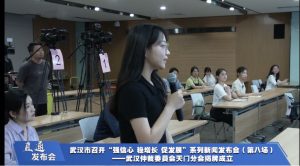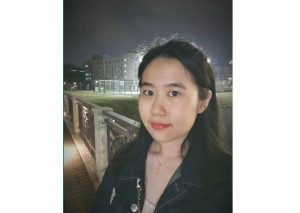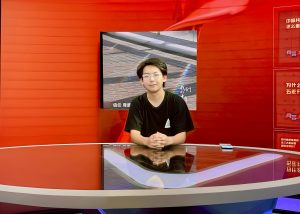In recent years, an increasing number of University of Macau (UM) students have chosen to participate in internships in mainland China in hopes of expanding their professional horizons. This trend may be attributed to the allure of innovative operating models employed by mainland media in the digital age, capturing the interest of students in the Department of Communication. In this issue of My UM, we interviewed four students who successfully completed internships at media companies in the mainland. They interned at People’s Daily, Changjiang Daily Newspaper Group, Chinese Workers Magazine, Phoenix New Media, and North News, respectively. They shared their internship experiences.
Understanding the mainland media environment
UM emphasises the integration of theory and practice in its teaching approach, and encourages students to apply their knowledge in real-world settings. With the advent of the digital era, an increasing number of enterprises, particularly those in the mainland media industry, have transformed and upgraded their businesses by incorporating digital technologies into mass communication. Against this backdrop, a rising number of students in the Department of Communication have chosen to pursue internships in mainland China in recent years. They want to gain first-hand experience in the new media work environment so as to prepare themselves for future career development.
On the first day of Li Xinwei’s internship at the Hubei branch of People’s Daily, her supervisor welcomed her with a powerful statement, ‘The fact that you are here means that you have the ability to report news independently.’ This remark immediately made Li realise that it was impossible to slack off in this job. Li said, ‘In this digital age where competition in the media industry in the mainland is so fierce, even as interns, we are expected to dive right into the action; we cannot be a burden to our colleagues.’
Li is a fourth-year student majoring in communication and a member of Stanley Ho East Asia College. Through the UM Reporter Programme, she accumulated some experience in news writing. However, she realised it was a completely different scenario when she was asking questions to officials at a government press conference in mainland China. This was much more challenging job than conducting interviews at UM.
‘The university feels like a greenhouse because there are always guidance and instructions from professors,’ explained Li. ‘However, when it comes to dealing with social issues independently and keeping pace with other news companies, it requires practical experience gained from numerous interviews. This is something textbooks cannot teach. As the Internet becomes more accessible, news media are having greater responsibility. They should amplify the voice of the public.’
In just three months, Li transformed from a trainee assigned to shadow senior colleagues and relying heavily on notes, to a journalist capable of covering news independently. Moreover, she published more than ten articles. ‘I wrote about various topics such as Hubei folk customs, stories of historical figures, and the local cultural heritage. This internship not only enabled me to learn to unravel the culture of Hubei, but also to gain insights into the operation of mainland media companies. Therefore, it was a valuable experience for me.’
Enhancing professional journalism skills
For students studying journalism and public communication, learning from outstanding news teams is an invaluable opportunity to enhance their professional competence. ‘You need three essential qualities to be a journalist: quick feet, sharp eyes, and an iron stomach. It means being able to run fast, observe everything keenly, and endure hunger. You need to be willing to work hard without complaints,’ said Zhang Fangbo as he reflected on his internship at Changjiang Daily Newspaper Group.
Zhang is a third-year student majoring in communication and a member of Stanley Ho East Asia College. During his internship at Changjiang Daily Newspaper Group, he had the opportunity to meet different kinds of people, and more importantly, he was moved by his supervisor’s passion for journalism. ‘Every news article is a witness to the city’s rhythm,’ he said. ‘Regardless of the topic, we must wholeheartedly engage ourselves in the articles and build a meaningful connection between the lives of the interviewees and the city.’
Among the people Zhang interviewed, he was most impressed by the athletes participating in the Wuhan Yangtze River Crossing Festival, an open-water swimming event that takes place in Wuhan every summer. Zhang was impressed because crossing the river not only requires mental strength but also physical endurance. On the day of the festival, Zhang set an alarm for 5:30am to avoid traffic congestion. He arrived at the riverbank before 7:00am and looked for potential interviewees.
Zhang said, ‘I interviewed a young girl who travelled all the way from Shanxi to Wuhan to fulfil her dream of swimming across the Yangtze River. I also interviewed a young man who, at the age of twenty, had already participated in the festival for four consecutive years. The festival was already a family celebration for him and his family. While the young man was swimming across the river, his parents would cheer for him on the riverbank. The atmosphere was very joyful.’
Nowadays, mainland media companies utilise various digital platforms to enable the 24-hour news cycle, and Changjiang Daily is no exception. Therefore, after conducting interviews at the festival, Zhang had to remain on site to write his articles. He made every effort to complete the articles before the athletes completed their river crossing, so that his company could share them on its social media platforms in real time.
Despite the difficulty, Zhang completed the task successfully. He attributed this to his training at UM, ‘We often had timed writing exercises in the news writing course at UM. These exercises familiarised me with meeting deadlines, and enabled me to complete the challenge at the end. This internship also honed my reporting skills and news literacy.’
Developing career adaptability at an early stage
Internships are an invaluable platform for developing professional skills, allowing students to cultivate crucial abilities such as effective communication, adept time management, problem-solving skills, and a strong sense of responsibility. Zhang Yixin, a third-year student majoring in communication and a member of Cheng Yu Tung College, gained valuable experience through the UM Reporter Programme before her internship at Chinese Worker Magazine. However, it was not until her internship that she realised that the realm of media work extends well beyond interviewing people and writing articles, as her very first assignment presented unexpected challenges in securing interviewees.
‘My first assignment involved conducting an interview with an influential person working at a famous century-old brand in Beijing. Moreover, he is an inheritor of an intangible cultural heritage. However, it was difficult to reach him by phone because he was extremely busy. This experience made me realise that it is also important to be skilled at scheduling interviews when you work as a journalist.’
With countless calls unanswered, Zhang resorted to another contact method: WeChat. She sent the person a WeChat message, explaining her intention and providing the interview outline she had prepared. Indeed, this was also how Zhang communicated with potential interviewees when she worked as a UM reporter. ‘The interviewing procedures and communication etiquette I learned at UM turned out to be very helpful. Soon I received a response from him and I was able to schedule an interview with him,’ said Zhang.
Chinese Workers Magazine emphasises multimedia integration; it features the integration of texts, images, videos, and audio. Therefore, in addition to writing articles, Zhang also needed to assist her colleagues in the shooting process. The tasks ranged from adjusting lighting and arranging the set, to operating the camera and guiding interviewees to adopt desired poses. Zhang said, ‘All of these tasks tested my adaptability skills, which will be helpful in my future work environments.’
Expanding professional horizons
UM hopes to facilitate students’ self-improvement and the exploration of professional growth through internship opportunities in the mainland. This initiative also prepares students for future engagement in national development. Zhang Jiahe, a second-year student majoring in communication and a member of Ma Man Kei and Lo Pak Sam College, interned at Phoenix New Media and North News. These experiences provided him with valuable exposure to a diverse range of news resources, enabling him to gain comprehensive insights into the reporting approaches and perspectives adopted in mainland China toward important events and issues.
During his internship, Zhang had the opportunity to attend press conferences held by local governments. Under the guidance of experienced journalists, he learned how to approach news topics from different perspectives and honed his new writing skills. Zhang said, ‘The scope of news coverage in mainland China is extensive and diverse, spanning domains such as politics, economy, society, and culture. Therefore, it is important to continuously broaden my knowledge base in order to stay well-informed.’
When it comes to the most enjoyable part of his internship, Zhang shared his experience interviewing Li Yunzhong. Li was a painter responsible for character styling and concept design of the mythical creatures in the film Creation of The Gods I: Kingdom of Storms. ‘It was an in-depth interview that not only delved into the painter’s personal growth but also explored the potential of reviving ancient mythology through ancient Shanxi murals and Chinese classical paintings. The experience was an eye-opener. I learned a lot,’ Zhang recalled.
In addition to news reporting, Zhang also engaged in the advertising campaigns of various brands, gaining insights into how to utilise media communication channels to promote projects and activities. This broadened his professional outlook on mass communication. ‘These internship experiences have given me a clearer and more comprehensive understanding of my chosen field, and have also boosted my confidence in pursuing a career in the media industry in mainland China,’ Zhang concluded.




